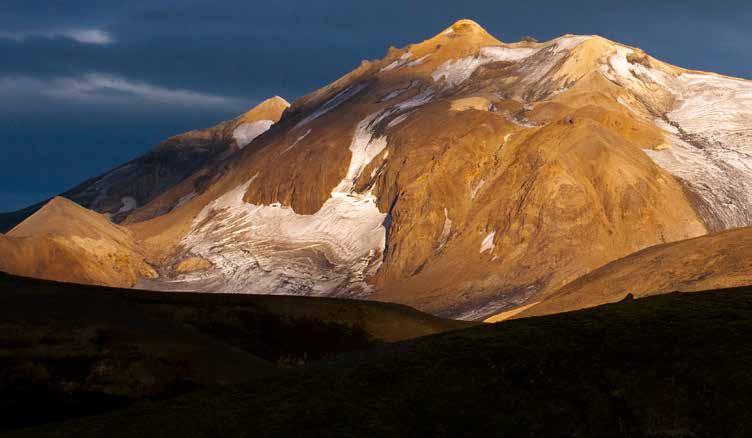
3 minute read
The Most Important Fishing Nation in Europe
The MosT IMporTanT FIshIng naTIon
In europe
Fishing is one of the pillars of Iceland’s economy, and the country is a leader in fishing sustainability.
Iceland is home to one of the world’s most modern and competitive fishing industries, based on the protection of the marine ecosystem and a sustainable harvest. Fisheries remain one of the strongest sectors of the Icelandic economy, making it responsible for a large share of both the GDP and the nation’s export revenue. Iceland, which is a small country with just 370,000 inhabitants, is undeniably one of the world’s leaders in total fisheries but has, in recent years, also become a leading country in the advancement of marine technology, fish detection instruments, as well as maintaining a sophisticated fishing sector, exporting world-class produce around the world. It’s difficult to overstate the importance of fish to Icelanders, and it has been the nation’s backbone throughout the centuries as its chief food supply and main export product. Historical evidence suggests that Icelandic fish export dates back to the 12th century at the very latest, so Iceland has centuries of experience.
Economic Impact
The fishing industry is one of the main pillars of the Icelandic economy. According to data released by Statistics Iceland, Iceland is the most important fishing nation in Europe. That year, Iceland was the third largest fishing nation in Europe after Norway and Spain and the 23rd largest fishing nation in the world. China was the largest fishing nation in the world in 2018.
Iceland’s fishing industry is one of the key industries in Iceland and directly employs around 7,500 people or approximately 4% of the total workforce on the island. The fishing industry contributed 8.1% to the GDP directly and 25% if an account is taken of the indirect effects of the ocean cluster. Additionally, in 2020, the export production of marine products amounted to ISK 270 billion (€1.8 billion), a total of 604 thousand tonnes.
Iceland’s exclusive fisheries zone has an impressive 760,000 square kilometres, seven times the area of Iceland itself. Some of the most extensive fish stocks in the North Atlantic are found within Icelandic waters, including halibut, haddock, and cod, which is Iceland’s most important stock.
Management System
The Icelandic fisheries management system was implemented to ensure responsible fisheries, an important issue for Iceland. The fisheries management in Iceland is based on extensive research on fish stocks and the marine ecosystem. Decisions on allowable catches for quotas are made based on advice from the Icelandic Marine Research Institute. Catches are then monitored and enforced by the Directorate of Fisheries. These are the main pillars of the Icelandic fisheries management intended to ensure responsible fisheries and the sustainability of the North Atlantic Ocean’s natural resources.
Rapid advances in Icelandic fisheries have been accompanied by the development of manufacturing and service industries that draw on long experience of the practical needs of fishing and fish processing operations. The fishing fleet is equipped with advanced technology; the same is true for the processing facilities on land. Among the leading fields are software, electronic and digital equipment, as well as landbased weighing and process control.
A wide selection of packaging for handling storage and retailing of fresh and frozen products are made in Iceland, as well as trawl nets, safety equipment and protective clothing. Icelandic manufacturers have designed and installed many processing plants around the world for companies ranging from vessel owners to industrial food processors.
Sustainable and responsible harvesting of wild fish stocks in Icelandic waters and good treatment of the marine ecosystem are of fundamental importance to Iceland. The fishing industry in Iceland is meeting the demands of buyers for sustainable use of marine resources with the Iceland Responsible Fisheries programme, developed based on commitments made through national law and international agreement.
Fish farming
Fish farming is on the rise in Iceland, as the total production of farmed fish in Iceland in 2017 was nearly 21,000 tonnes. Iceland has taken pride in the fact that several fish diseases are not found in Icelandic-farmed fish, and all reasonable precautions are taken to prevent the introduction of new fish pathogens to the Icelandic aquatic environment.
Atlantic salmon has seen considerable fluctuations in production, from almost 7,000 tonnes in 2006 down to just 292 tonnes in 2008 and 3,260 tonnes in 2015. The production growth has since been high; in 2017, the production reached over 11,000 tonnes. It is expected that salmon will remain the most important farmed species in Iceland over the next several years, with annual production expected to rise to 22,000 tonnes.
Iceland’s fishing industry is thriving and remains one of the most important in Europe.











